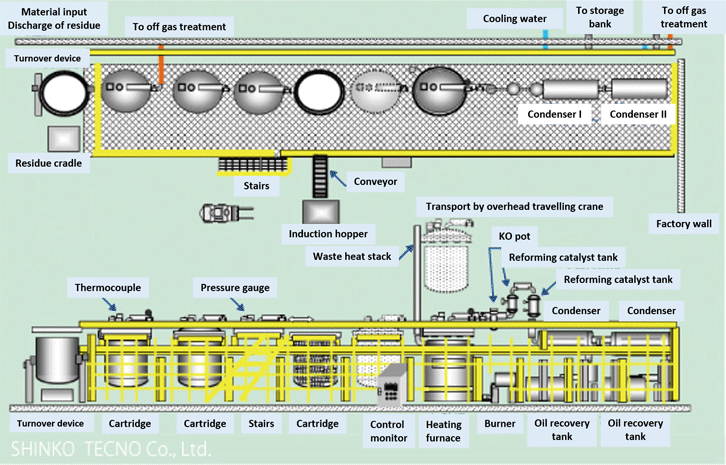Plastic to Oil Machine Ideal 

for Power Generation in
Developing Countries
C reated by Shinko Tecnos Co., Ltd., this plastic to oil machine is used to make liquid fuel, combustible gas and carbonized products – all from waste plastics and products originating from crude oil. As such, these recycled energy resources are ideal for use in industries where energy is in high demand as well as for generation of power in developing countries.
In addition to waste plastics, this system can also treat the following: E-waste, Tire waste, Toner waste, Medical waste.
Shinko Tecnos. Co., Ltd. is leading the march in recycling renewable resources. The company is trying to educate the public on the enormous amount of waste we generate. Why throw trash away when we can recycle it for good use? Turning waste into fuel is at the heart of this technology.
Major Features and Advantages
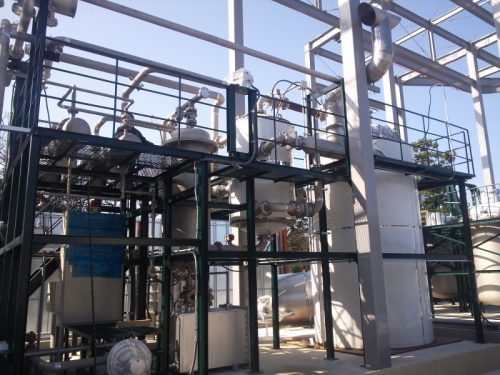 I. Simple Operation
I. Simple Operation
The machine’s concept is extremely simple, which makes it easy for machine operators and plant workers to understand. The machine is durable, too, making it difficult to be broken by operators. Maintenance is possible without needing a high level of technical expertise.
II. Cost and Energy Savings
Because the machine is so easy to operate, it does not take up limited resources. With such efficient operation, there is a marked decrease in the cost associated with running it due to low energy consumption.
III. High-Quality Production
Thanks to the high-quality production of heavy oil and light oil, the oils can be utilized for power generation. In addition, the machine can produce low tar oil, which decreases the possibility of burner nozzle clogging, often caused by high tar oil.
IV. Safety
Safety is ensured through the adoption of the following:
- Emergency stop system (forces stoppage of plant operation by filling nitrogen gas in times of emergency)
- Forced cooling system (prevents process of thermal decomposition by decreasing the temperature with fresh air)
- Gas burning system (detoxifies light gas through the process of burning)
This technology created and marketed by Shinko Tecnos Co., Ltd. aims to increase the re-use of waste and reduce energy costs at the same time. The result is a waste plastic to oil machine operated through the use of thermal decomposition technology.
Technology Data
Conceivable application
Our thermal decomposition plant, so-called ‘plastic to oil machine’, is used to manufacture liquid fuel, combustible gas, and carbonized products from waste plastics and crude-oil derived products.
These produced (recycled) energy resources can be distributed to energy demanded industries or any other purposes that requires power generation in developing countries.
Recent trend shows that there are growing needs from our customers to install our system to treat not only waste plastics but also E-waste, waste tire, waste toner and medical waste.
Competitive advantage
Simple machine operation
Concept of our machine is simple so that it is very easy for plant workers to understand and operate. Our machine is very simple but it is hard to be broken. Maintenance can be conducted without high level technical expertise. High level safety is maintained by adopting emergency stop system, forced cooling system and gas burning system.
Cost and energy saving machine
Because of the reasons mentioned in ‘Performance’ Section below, our machine can be operated efficiently by reducing the running cost and energy consumption of plant machine operation.
High quality production of heavy and light oil
Heavy oil and light oil generated by our plant machine can be used for power generation.
Performance
Batch process system
BP-2000N/5000N (Plastic to oil machine), is a batch process system so that it can be utilized for multiple purposes such as treatment of waste plastics, waste tires, waste fishing nets, medical wastes, and precious metal recovery from cellular phones. Also, our plant can treat chlorine-based and halogen-based hazardous substances. It is important to note that time to complete the decomposition process from waste plastics to oil is about 5-6 hours (Depending on the quality of waste plastics, it may take longer to complete the process).
Low tar oil production
High tar oil often causes usage issues for end-users (i.e. clogging of burner nozzle) so low tar oil production is highly regarded. With our plant machine, low tar oil can be produced by selecting a suitable catalyst based on what type of wastes to be treated.
Cost reduction and energy efficiency
Because our plant can be operated with a low fuel consumption, and liquid fuel produced is used as a heat source for the system, it is possible to effectively reduce running cost and energy consumption.
Two step gas cooling system
By utilizing two step gas cooling system, light oil and heavy oil can be recovered separately. During the liquidation stage for gas generated by thermal decomposition, heavy oil is extracted in the first step and light oil is extracted in the second step.
Safety
High level safety is achieved by adopting the following systems: 1). emergency stop system, which forces to stop the plant operation by filling nitrogen gas when in emergency, 2). forced cooling system, which prevents process of thermal decomposition by reducing the temperature of oven and catalyst layer with fresh air, and 3). gas burning system, which detoxify light gas (i.e. gas residue after thermal decomposition) by gas burning.
Technical maturity Past record of introduction
| Year | Waste input | Product output | Size (L) |
Location |
| 2003 | Use for experiment | Use for experiment | 20 | Kanagawa Prefecture, Japan |
| 2004 | Urethane | Reclaimed oil | 60 | Tokyo, Japan |
| 2004 | Wood | Charcoal/ Wood vinegar |
80 | Ishikawa Prefecture, Japan |
| 2005 | Waste oil | Reformate | 25 | Qingdao, China |
| 2006 | Waste plastics | Reclaimed oil | 30 | Chiba Prefecture, Japan |
| 2006 | Waste oil | Reformate | 70 | Hokkaido, Japan |
| 2006 | Waste plastic/oil | Reclaimed oil/ Reformate |
70 | Hokkaido, Japan |
| 2006 | Waste plastic/oil | Reclaimed oil/ Reformate |
3000 | Osaka City, Japan |
| 2006 | Waste oil | Reformate | 4000 | Ehime Prefecture, Japan |
| 2006 | Bamboo | Bamboo coal/ Bamboo vinegar |
200 | Osaka City, Japan |
| 2006 | Mobile phone | Reclaimed oil/ Valuable residues |
200 | Tokyo, Japan |
| 2007 | Waste plastic | Reclaimed oil | 2000 | Fukui Prefecture, Japan |
| 2007 | Waste oil | Reformate | 200 | Tokyo, Japan |
| 2008 | Waste toner | Reformate | 2500 | Osaka City, Japan |
| 2008 | Waste oil | Reformate | 70 | Tokyo, Japan |
| 2009 | Waste tire/ Electric wire |
Reclaimed oil/ Steel wire |
5000 x 2 | Yamagata Prefecture, Japan |
| 2010 | Waste plastic | Reclaimed oil | 1000 | Hiroshima Prefecture, Japan |
| 2012 | Use for experiment | Use for experiment | 10 | Yogyakarta Indonesia |
| 2013 | Waste plastic/ Hospital waste |
Reclaimed oil | 5000 | Shimane Prefecture, Japan |
| 2014 | Use for experiment | Use for experiment | 10 | Jeddah, Saudi Arabia |
<Photos of Implemented Plants>
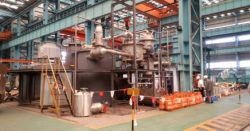
(1) China (size 4500L), since 2015
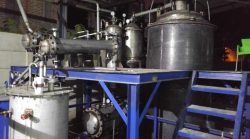
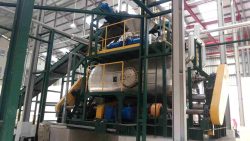
(2) Indonesia (size 1000L), since 2014
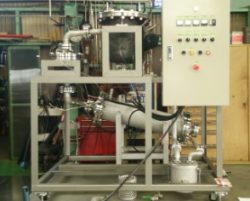
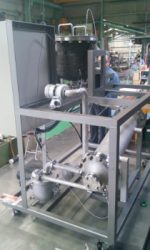
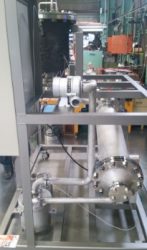
(3) Saudi Arabia (size 10L), since 2014
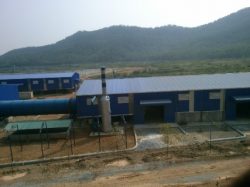
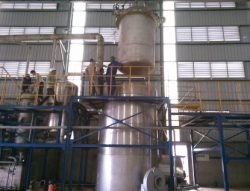
(4) Vietnam (size 5000L), since 2013
Shinko Tecnos’ technologies are also featured on the website of the Japan External Trade Organization (JETRO). The further details can be found in English![]() / Español
/ Español![]() / 中文繁体字
/ 中文繁体字![]() , and also from the following; https://www.jetro.go.jp/en/mjcompany/shinko_tecnos/
, and also from the following; https://www.jetro.go.jp/en/mjcompany/shinko_tecnos/![]() (English, 2016).
(English, 2016).
Conceivable risk
If the plant machine is not operated properly, there is risk of loss and damage from fire.
Information on patent related to this technology
2004-182961: Waste plastic changing to oil machine by using thermal decomposition technology.
2010-222547: High polymer waste changing to oil plant.
Company Data
| Name | Shinko Tecnos Co., Ltd. |
| Address | 1-1-20 Masumida Ichinomiya Aichi, 491-0043, Japan |
| Capital | 30,000,000 JPY |
| Contact person | Kentaro NAGASAWA Tel.: +81-586-28-9461 Mob.: +81-90-7237-1370 Email: info@shinko-mfg.co.jp |
| Number of employees | 12 |
| Date of company foundation | October 1996 |
| The type of business | Engineering of recycling and waste treatment plants. |
International operation
| Number of employees for international operation(including overseas operation, if any) | 4 | |
| Overseas offices | City , Country | Name of company |
| Shanghai, China | Shanghai tekunuo huabao shebei youxiangongsi | |
| Jakarta, Indonesia | Shinko Teknik Indonesia | |
Modality of business transaction
Partnership
We are looking for local partners for setting up, commissioning and trial operation of our plant machine. We would send a supervisor from Japan to local plant site. In return, we would ask local partners to send their workers to the plant site. Eventually, we would like our local partners to operate and manage the plant site and also do the maintenance work for us.
Attachments
Contact Person(s)
*Please mention that you saw UNIDO's website when making the first contact with the company.
Registered Category
- Energy Technologies : Renewable energy
- Environmental Technologies : Circular Economy (3R)


